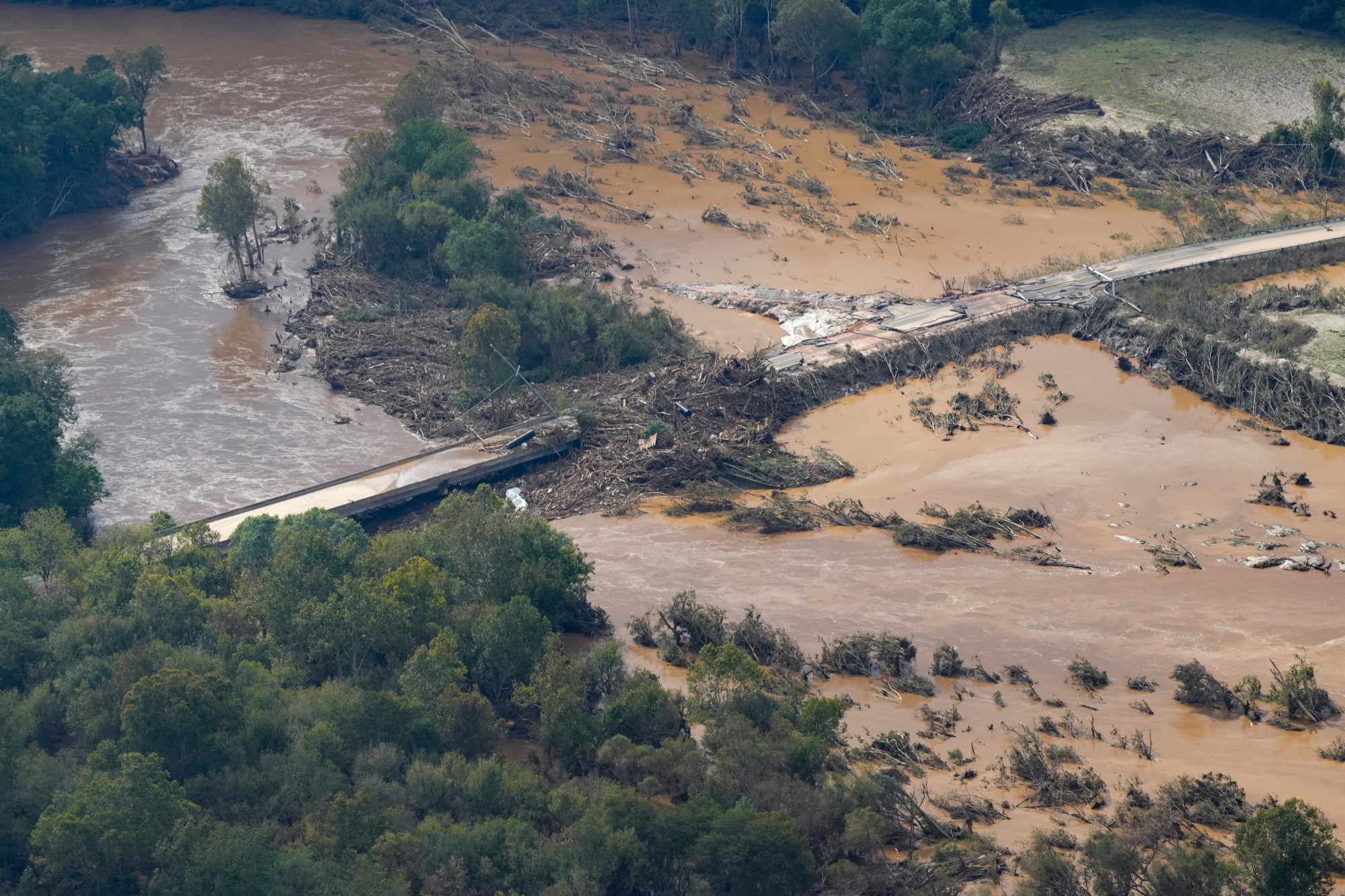
Hurricanes, Floods, and Lies We Believe
Looking at the photos is not for the faint of heart. A weeping couple in Florida embraces over the rubble that used to be their home. Traffic stalls on I-40 in North Carolina due to missing pieces of the interstate after excessive rain and mudslides. An engulfed Nolichucky Dam in east Tennessee weathers twice the amount of water that flows over Niagara Falls. Overturned vehicles, floating houses, and leveled communities spanning over 600 miles are all clues that Hurricane Helene was no ordinary storm.
The state of Florida absorbed the initial brunt of the barrage as 140 mph winds first ravaged the Big Ben region, leaving splintered lives and busted power grids from Naples all the way up to Tallahassee. Next, Georgia suffered what Governor Brian Kemp described as a bomb that appeared to go off as Helene continued to march north, wreaking havoc from Valdosta over to Augusta.
Though the deadly hurricane soon downgraded to a tropical storm, unprecedented flooding persisted in upending the lives of people in South Carolina, North Carolina, Tennessee, and Virginia. Meteorologists estimate that 40 trillion gallons of rain fell on the southeast, an amount so staggering that some refer to it as apocalyptic. ABC News equates that much water with emptying Lake Tahoe entirely or filling the Dallas Cowboys’ AT&T Stadium 51,000 times.
These floodwaters weigh a staggering 1700 pounds per cubic yard, causing immense damage as they descend from the saturated mountains of Appalachia. At the time of this writing, 400 roads remain closed in North Carolina. Over 130 people have died, and hundreds remain missing. Focusing rebuilding efforts is difficult because the needs are so great. The lasting impact from this once in a lifetime storm will be generational.
Nearly everyone is sympathetic toward those who are facing devestating loss due to Hurricane Helene. Rallying one another to support disaster relief work during a time like this is not a burden because most people are genuinely eager to help. There are unfortunate exceptions, however. Even as rains continued to fall over parts of the southeast, a former University of Kentucky staffer had the audacity to suggest that the storm might be God’s way of punishing MAGA populations for their hate and hypocrisy. Despite initially doubling down on her vile comments with even more offensive rhetoric, the self-described feminist poet eventually took her social media posts down.
I do not mean to suggest that only one side of the political aisle spews reckless remarks like these. Both the right and the left have an unspoken underbelly that we must be careful to resist despite its subtlety. Sometimes, when catastrophe strikes, we might instinctively place people into the categories of being deserving or undeserving of calamity. In other words, those in the path of the storm must have deserved it, and those outside its reach did not.
Thankfully, Jesus addressed this air of superiority that routinely plagues our perspective of tragedy. When the unthinkable happened south of Jerusalem in a place called Siloam, our Savior asked, “Do you suppose that those eighteen on whom the tower in Siloam fell and killed them were worse culprits than all the men who live in Jerusalem? (Luke 13:4)” Certainly, this burden was different than a hurricane, but the principle regarding the afflicted remains the same.
To state Jesus’ inquiry differently, did the people in Siloam deserve to die? Where those people more wicked than you? By asking the question Jesus is highlighting our temptation to insist on the moral culpability of others while denying our own. We erroneously equate our safety with our perceived righteousness while assuming the demise of others is the consequence for their wickedness.
Jesus is not denying that tragedies of any kind can be acts of judgment, but He is insisting that it is not our job to discern what God is doing or to excuse ourselves from moral responsibility. We should never feel puffed up simply because bad things do not happen to us. God’s mercy, not our sinlessness, keeps us safe each day. The problems we face in life are not always reflective of our position before God. Don’t forget that Old Testament character Job suffered because He was righteous, or the opposite of what we would suspect (Job 1:8).
Do you secretly find pleasure in the misfortunes of other people, especially those you don’t care for? When you hear that someone has cancer, do you wonder if they had it coming? If you learn of someone losing their job, do you assume he deserved it? Is your attitude toward the family with a rebellious child that they must be terrible parents?
Jesus pushed back against such distorted thinking with a piercing declaration and instruction, “I tell you, no, but unless you repent, you will all likewise perish (Luke 13:5).” From God’s perspective, hardship is sometimes as much about the casual observer as the person who is hurting. Has it ever occurred to you that God might use sweeping devastation, not to punish the immoral, but to challenge wayward spectators in need of repentance? The point of Jesus’ story is not about those who died, but those who remained.
Scripture clearly teaches that every person is a sinner who will face death as a result (Rom. 3:23, 6:23). Thus, Jesus insists “you will ALL likewise perish” apart from repentance. Eternal life requires our turning away from sin in order to follow Christ in faith. Thus, no tragedy should be an occasion to boast, but is instead, an opportunity to remember that God is merciful despite our sin rather than due to its absence. The burdens of others are an invitation to repent of our rebellion rather than laud our righteousness.
Adam B. Dooley
October 1, 2024

